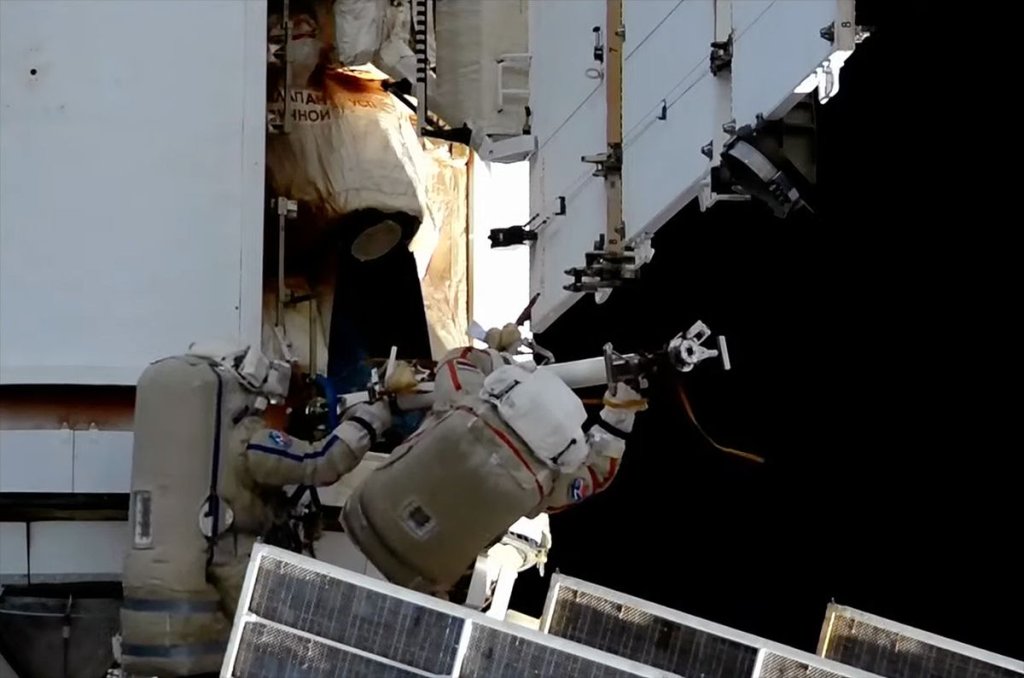
Cosmonauts on ISS spacewalk encounter toxic coolant ‘blob’ while inspecting leaky radiator (Image Credit: Space.com)
Two cosmonauts conducting a spacewalk outside the International Space Station (ISS) on Wednesday (Oct. 25) got an up-close view of a coolant leak that was first observed flowing from an external radiator earlier this month.
Oleg Kononenko came so close to the growing “blob” or “droplet” — as the pooling ammonia was described — that one of his tethers became contaminated, necessitating it being bagged and left outside of the space station when the spacewalk ended.
Kononenko and his fellow Expedition 70 spacewalker, Nikolai Chub, also of the Russian federal space corporation Roscosmos, began the extravehicular activity (EVA) at 1:49 p.m. EDT (1749 GMT) on Wednesday, knowing that one of their first tasks was to isolate and photo document the radiator, which was first observed leaking coolant on Oct. 9. Used as a backup to a main body radiator that regulates the temperature inside Russia’s Nauka multipurpose laboratory module, Kononenko and Chub configured a number of valves to cut off the external radiator from its ammonia supply.
Related: International Space Station — Everything you need to know

After that was complete and before noticing the growing deposit of liquid coolant, Kononenko reported seeing a myriad of small holes on the surface of the radiator’s panels.
“The holes have very even edges, like they’ve been drilled through,” Kononenko radioed to the flight controllers working in Moscow Mission Control. “There are lots of them. They are spread in a chaotic manner.”
The “blob” was believed to have formed from the residual ammonia that was disturbed when the work was done to close the valves. Knowing in advance they might come in contact with the coolant, the cosmonauts were prepared with tissues and cloths to wipe down their spacesuits and tools so as to not bring any the toxic material back inside the space station.
Russian engineers on the ground will use the data collected by the cosmonauts to further determine the cause for the leak and what steps might be taken to return the radiator to use in the future.

In addition to the radiator inspection, Kononenko and Chub also worked to install a synthetic radar communications system and released a nanosatellite to test solar sail technology. The radar, which will be used to monitor Earth’s environment, was the first science payload to be mounted on Nauka’s exterior. The radar’s panels only partially deployed, and an attempt by the cosmonauts to get it to fully deploy was not successful.
The cube-shaped smallsat, which was developed by a team at the Bauman Moscow State Technical University, was designed to test a means for deploying an experimental solar sail. With a little coaxing, the nanosatellite emerged from its housing and slowly tumbled away from the space station, but the solar wings did not extend when planned.
The 7-hour, 41-minute spacewalk came to its end with the hatch being closed to the Poisk module airlock at 9:30 p.m. EDT (0130 GMT on Oct. 26).
The EVA was the 268th in support of space station assembly, maintenance and upgrades. It was the first by Chub and the sixth spacewalk by Kononenko, who has now logged a total of 41 hours and 43 minutes working in Orlan spacesuits in the vacuum of space.





